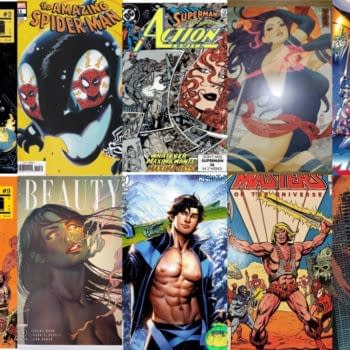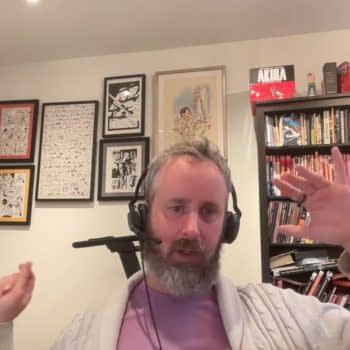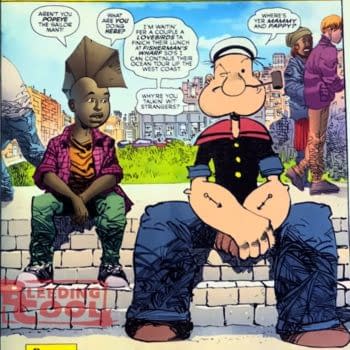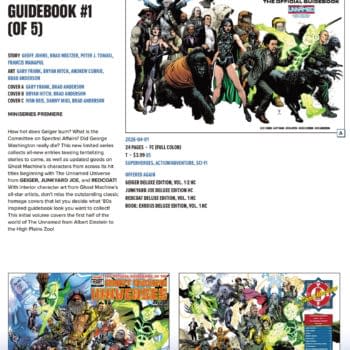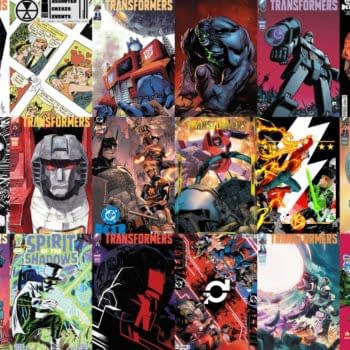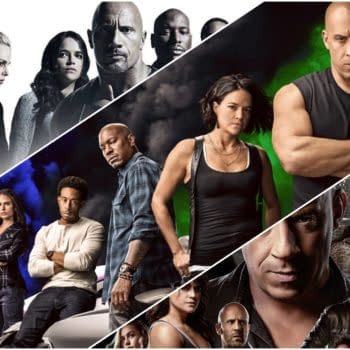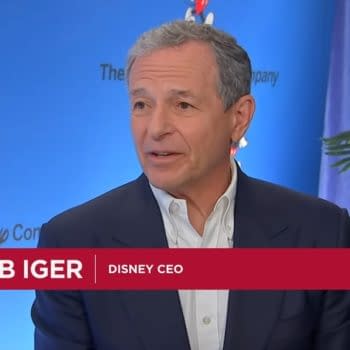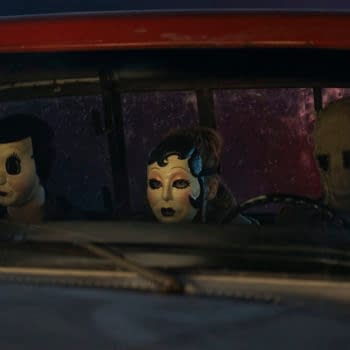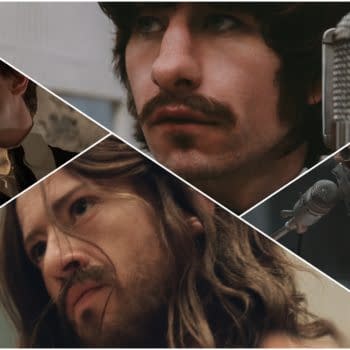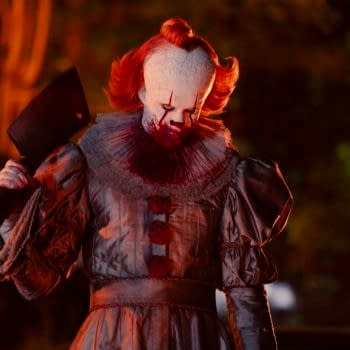Posted in: Look! It Moves! by Adi Tantimedh, Movies | Tagged: homeland, skyfall
Look! It Moves!: Our Year Of Romance With Spies
2012 has been the year of Spies in pop culture, perhaps more than any other. We've had the latest James Bond flick SKYFALL, the second season of HOMELAND as popular and big a talking point as ever, and now Kathryn Bigelow's problematic ZERO DARK THIRTY.
Two things stand out to me about these shows: their popularity reflects an ongoing public fascination with spies and the genre. Just when the genre looked on its last legs when the Cold War ended, along came a new, more insidious boogeymen to give new life to the stories. It's all about leaks and hunting terrorists now rather than Commies. 9/11 is still the elephant in the room we call pop fiction, and spy fiction is the drama of the day.
All genre fiction is about control, giving the audience a sense of control over a world that's chaotic and dangerous. Where Crime Fiction with protagonists who break the law are tragedies about transgression and paying the price of crime, Cop Fiction is being the hero who brings order to a dark and dangerous world. Spy Fiction, more than Crime Fiction, is about uncovering and discovering the secret dealings underneath the world we think we know. And as the popularity of James Bond attests, the fictional spy still carries a glamour and mystique the heroes of crime fiction don't. The spy gets at the murky dark truths of the world that are kept from the rest of us. They come to KNOW and they have the existential burden of having to keep the secret. It speaks to our anxiety that the truth is being kept from us. It serves as a metaphor about lies and truth and the moral consequences of keeping or revealing them.
All well and good, but in my day-job as a screenwriter and story editor, I've had the chance to meet people who worked in intelligence in real life for research and just about all of them shake their heads at the total fantasy of popular spy fiction, movies and TV. As a result, I often watch spy movies and TV and wince at how silly the fantasy gets, a fantasy that both show business and audiences seem to cling to like a security blanket despite more than enough newspaper reports and nonfiction books that point out how things might really work.
This is especially true of SKYFALL, which has a script shot full of holes and motivations and details that make no sense. You could argue that James Bond scripts have always been nonsensical, but up until now, they carried at least a patina of plausibility, even minimal, but blown over the top. My problem with SKYFALL's script is it has the most ridiculous assumptions and details while trying to pass itself off as more realistic than any Bond film to date. The fact that it's making a bajillion dollars at the box office proves just how strong a hold the fantasy of the glamourous, drinkin', shootin', shaggin' secret agent still holds in the public imagination.

ZERO DARK THIRTY, which just opened for Oscar consideration and critical fawning, has entered dark and murky waters in its retelling of the hunt for bin Laden. The terse documentary style gives an illusion of feeling like The Truth, and the movie's insistence on extended scenes of torture end up tacitly acknowledging that torture is an essential tool in the interrogation of detainees, a sentiment that actual spies and officials in the know have actively opposed and objected to. It's not just that Bigelow and her screenwriter have taken no clear stance on torture, but to imply that it helped unearth the first tiny clue that eventually led to bin Laden is a problematic use of art to propagate a political issue. It's disingenuous for an artist to then claim not to be political when tackling a story that is bursting with political and moral questions. The rest of the movie gets overshadowed by the issue itself, with editorials passionately debating whether the movie is pro-torture, though it doesn't actually help the movie's reputation in the end. You could argue that a movie is fiction and people shouldn't be so worked up about that, but a fiction based on a true story has more responsibility to reflect the facts than to make up or imply untrue ones as this movie has here. Salon has the latest angry, passionate attack.
History is full of artists who create works that espouse monstrous political views, often at the demands of state propaganda, but in this case, members of the government and even the CIA have come forth to condemn the movie's presentation of torture as an expect and normal procedure in intelligence-gathering. This suggests the movie is itself caught between pro- and anti-torture factions in Washington, never mind the public or the media. What the movie is in danger of doing is, as much the likes of 24 and various videogames and comics, making torture seem normal and acceptable to the general pop-consuming public. The movie feels to me like an upmarket version of 24. In claiming not to take a stance while depicting something that's untrue, the movie ends up pro-torture by default, whether it meant to or not. It also makes its heroine complicit in torture and morally tainted while the real-life intelligence officer didn't get her intel from torture at all.
Kathryn Bigelow is a director whose work I've admired for a long time, all the way back to NEAR DARK, the only vampire movie worth a damn as far as I'm concerned, the wonderfully loopy macho-fest POINT BREAK, the cyberpunk thriller STRANGE DAYS before her success with THE HURT LOCKER. But with the morally questionable depiction of torture in ZERO DARK THIRTY, I can't help but think of a director for the last century who sold her talents to the state to pursue a career was Leni Riefenstahl and her movies for the Nazi regime. Both Riefenstahl and Bigelow are female directors with a fascination for masculine rituals and action, and I don't want to compare Bigelow to someone as hideous as Riefenstahl, and I don't mean to be insulting or trolling, but I have to ask:
Has Kathryn Bigelow inadvertently turned into the Leni Riefenstahl of the 21st Century with this movie?
All this calls into question the moral responsibility of artists and art itself: how much or how little should the artist have in creating art? If you haven't read Clive James' masterful and slyly funny takedown of Leni Riefenstahl from 2007, I highly recommended it.
What kind of irritates me is the insistence in pop culture on spy stories being so po-faced and somber. Chris Morris' heavily-researched dark comedy about wannabe-terrorists FOUR LIONS feels closer to real life than most serious spy movies and TV shows, and that movie has been largely ignored by the general public and culture because they prefer the deadly-serious story of anguished good guy spies chasing swarthy foreign superbaddies out to destroy our Pwecious Fweedoms.
Unlike movies, which are done in one go, television series continue the dialogue, the relationships, the themes for the audience for months on end. The shadow of 24 also casts a shadow over HOMELAND, what with many of its writers and former showrunner being on the staff on this show.
I'm not a fan of HOMELAND. I find most of it ridiculous, especially in the way it creates supervillains out of terrorists and making the CIA seem lax and incompetent. Its heroine is one of the dumbest and most implausible intelligence officers ever created for television, since she would never have been allowed to join the agency to start with, and then the silliness just snowballs from there. It's one of those shows that create its own internal logical of utter bollocks and then sticks to those rules, which is generally made up of dumb corner-cutting melodrama common to TV writing, probably as a result of the deadline pressures of creating a weekly show. I look at HOMELAND just to see what's in the minds of TV writers, Hollywood and the culture in general, reading the zeitgeist, to put it pretentiously.
I'm continually bemused by how popular HOMELAND is and how seriously viewers take it. I keep seeing how silly the plot and character elements have been since the pilot episode, and I laughed when people complained they found season 2 unbelievable. "You're only finding it unbelievable NOW?" I would think. And as I read Twitter comments of fan reactions to the show over year, it finally dawned on me:
HOMELAND is really a Harlequin romance for the post-911 era.
I mean, think about it: it's really about a flawed but brilliant woman falling in love with a damaged and dangerous man… or put it this way:
"SHE'S A MENTALLY-UNSTABLE CIA AGENT! HE'S A RELUCTANT TERRORIST! THEY FALL IN LUUURVE!!"
Of course, the demands of ongoing television and the genre of romance means they have to be kept apart to prolong the show and up the ratings. Romance works best when there's more agony, not less. When I saw the finale, I laughed my arse off. Spy fiction, which has always been a kind of romance, has come to this. I consider HOMELAND to be hilarious kitsch. Decades from now, it might be a camp classic, worthy of ROCKY HORROR PICTURSHOW-style worship.
Spy fiction has now fully come to reflect our confusion, our fascination with secrets and lies, and our Stockholm Syndrome.
Merry Christmas, all!
Spooky spooky at lookitmoves@gmail.com
Follow the official LOOK! IT MOVES! twitter feed at http://twitter.com/lookitmoves for thoughts and snark on media and pop culture, stuff for future columns and stuff I may never spend a whole column writing about.
Look! It Moves! © Adisakdi Tantimedh









